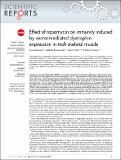Effect of rapamycin on immunity induced by vector-mediated dystrophin expression in mdx skeletal muscle
Author(s)
Eghtesad, Saman; Jhunjhunwala, Siddharth; Little, Steven R.; Clemens, Paula R.
DownloadEghtesad-2012-Effect of rapamycin.pdf (322.9Kb)
PUBLISHER_CC
Publisher with Creative Commons License
Creative Commons Attribution
Terms of use
Metadata
Show full item recordAbstract
Duchenne muscular dystrophy (DMD) is caused by mutations in the dystrophin gene. Therapeutic gene replacement of a dystrophin cDNA into dystrophic muscle can provide functional dystrophin protein to the tissue. However, vector-mediated gene transfer is limited by anti-vector and anti-transgene host immunity that causes rejection of the therapeutic protein. We hypothesized that rapamycin (RAPA) would diminish immunity due to vector-delivered recombinant dystrophin in the adult mdx mouse model for DMD. To test this hypothesis, we injected limb muscle of mdx mice with RAPA-containing, poly-lactic-co-glycolic acid (PLGA) microparticles prior to dystrophin gene transfer and analyzed treated tissue after 6 weeks. RAPA decreased host immunity against vector-mediated dystrophin protein, as demonstrated by decreased cellular infiltrates and decreased anti-dystrophin antibody production. The interpretation of the effect of RAPA on recombinant dystrophin expression was complex because of an effect of PLGA microparticles.
Date issued
2012-05Department
Koch Institute for Integrative Cancer Research at MITJournal
Scientific Reports
Publisher
Nature Publishing Group
Citation
Eghtesad, Saman, Siddharth Jhunjhunwala, Steven R. Little, and Paula R. Clemens. “Effect of Rapamycin on Immunity Induced by Vector-Mediated Dystrophin Expression in Mdx Skeletal Muscle.” Sci. Rep. 2 (May 8, 2012).
Version: Final published version
ISSN
2045-2322